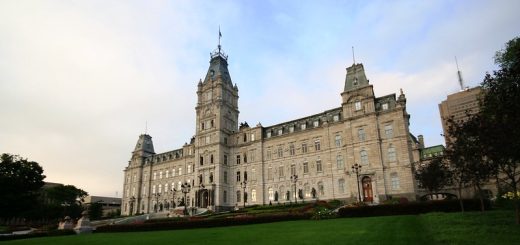Hypothecary Rights Questioned in Toronto-Dominion Bank v Young

With housing prices skyrocketing in various metropolitan regions across Canada, the demand for mortgages—known as hypothecs in Quebec—has also increased. Yet in times of economic hardship, creditors are prone to default mortgages borrowed from banks as well as independent mortgage providers. Unlike the rest of Canada which maintains that property is owned through a fee simple ownership even when the homeowner takes out the mortgage, Quebec maintains that a hypothec provides the mortgage provider “a real right on a movable or immovable property…”, where “immovable property” refers to real estate (Civil Code of Quebec, SRQ c C-1991, [CCQ] art. 2660). In other words, the property owner keeps a personal right to the property while the obligation of the mortgage entitles the mortgage provider with a separate real or hypothecary right until the mortgage is paid off. If the debtor fails to perform the obligation—that is, pay the mortgage, the hypothecary right allows the creditor to claim hypothecary remedies.
Recently in Toronto-Dominion Bank v Young, 2020 SCC 15 [Young], the Supreme Court of Canada (“SCC”) was faced with answering the question of whether a hypothecary right, which belonged to third-party lenders Harold and Robert Young (“Youngs”), was independent from a hypothecary remedy, sought by the appellant Toronto-Dominion (“TD”) Bank’s claim of hypothecary rights. The decision was rendered from the bench on November 7, 2019, with an overwhelming majority of the SCC upholding the appellate decision rendered by the Quebec Court of Appeal (“QCCA”). This past June, Justice Suzanne Côté wrote and published her lengthy dissent. If relied on in future proceedings, her dicta has the potential to fundamentally alter the landscape of property rights and remedies in Quebec.
The Facts
On September 14, 2009, Linda Macht (“Macht”) took out a mortgage with the plaintiff TD Bank for $306,000, secured by an immovable located on 118 Eardly Road, Gatineau. The same day, she secured a second mortgage with Youngs, valued at $94,160. The Youngs were aware of the hypothec with TD Bank at the time Ms. Macht signed an agreement with them.
Approximately a year later, Macht signed a new “Mortgage Renewal Agreement” with the appellant, which changed the interest rate of her mortgage for five years in exchange of a “cash back amount” of $15, 231.27. Despite this new deposit, on October 17, 2011 Macht defaulted to the Youngs, who subsequently obtained a judgment for a forced surrender of her property. Soon after, TD Bank also realized that Macht had defaulted in her payments, and on November 25, 2011, informed her to pay her late payments. By this point, however, the Youngs were deemed the new owners of Macht’s property.
In accordance with the CCQ, art. 2758, TD Bank filed a motion for forced surrender of Macht’s property in February 2012, 60 days after the notice of exercise of hypothecary rights was served, allowing her to surrender the property herself. Following the forced surrender motion, the respondents remedied the default under protest on behalf of Macht, which resulted in TD Bank discontinuing its proceedings in March 2012. Instead, on July 10, 2012, TD Bank filed a new notice of exercise of hypothecary rights against the Youngs for the amount due ($327,661.90). After failing to receive the remedy, that October, TD Bank filed for a motion of forced surrender against the respondents, unable to claim the hypothecary remedy against Macht who was “nowhere to be found” (Young, para 13).
Procedural History
Quebec Superior Court
Appearing before the Quebec Superior Court, the Youngs raised two lines of arguments, both of which argued for the elimination of TD Bank’s hypothecary rights. First, they argued that because the 2010 loan agreement with Macht succeeded the Youngs’ loan agreement, the agreement with TD Bank was of a lower rank than that of the Youngs and subsequently, novation was effected. In real estate law, novation refers to the notion that a new contract would replace the older contract (CCQ, Art. 1660); in the current context, the Youngs were arguing that the 2010 contract between TD Bank and Macht removed the hypothecary right attached to the property newly owned by the Youngs. The trial judge dismissed this argument saying “novation had not been effected and that even if the renewal had created a new debt, it would be a future debt covered by the hypothec” (Banque Toronto-Dominion c. Young, 2016 QCCS 838, para 51). This effectively ruled out the possibility that the hypothecary right was extinguished when the property was forcefully surrendered to the Youngs.
The second defence raised was a procedural one: the plaintiff had three years for their issue to be heard pursuant to Art. 2925 of the CCQ. Since TD Bank had served Macht in November 2011 with a notice to exercise a hypothecary right, this right expired in 2014. Justice Goulet of the Superior Court also ruled against this argument, saying that Macht was impossible to find and thus serving the respondents was sufficient to constitute an action. Relying on Banque Nationale c Ruel, [1995] RJQ 2180, and Matériaux de la pointe inc. c Rousseau, [1996] RJQ 331, Justice Goulet added that a failure to serve the original debtor was not problematic since the real rights—the property—rested with the defendants and not the debtor herself. Thus, the Superior Court ruled in favour of the TD Bank and ordered the Youngs to surrender the property.
Quebec Court of Appeal
The Youngs appealed to the QCCA, which unanimously overturned the Superior Court decision. The Court began by emphasizing that a “hypothec is accessory to the obligation it serves” (Young c. Banque Toronto-Dominion [Young II], 2018 QCCA 810, para 22; art. 2661) and the hypothecary can only be extinguished when the obligation is extinguished (art. 2797). Though the obligation was not prescribed when TD Bank served a notice to exercise the hypothecary right to Ms. Macht, the Court held that this right was prescribed in the hypothec proceedings.
Applying these facts, the QCCA found that by the time the case was brought to court, the possessory right had been extinguished. The latest that TD Bank could argue the three-year period started was when they asserted a hypothecary right against the Youngs in July 2012, but even then, the first hearing was held on November 5, 2015, exceeding the three-year deadline. Even if this were not the case, the QCCA wrote that since the “Mortgage Renewal Agreement” was prescribed for five years—the maturity date of the agreement had been reached—which had also passed at the time of trial. In fact, the Court wrote:
En l’occurrence, le tribunal aurait dû rejeter l’action hypothécaire dirigée contre les appelants. Au 19 février 2016, même si cette action, en tant que telle, n’était pas prescrite (art. 2923 C.c.Q.), la créance, elle, l’était et l’intimée ne pouvait plus en réclamer le paiement à la débitrice. L’accessoire doit suivre le principal, si bien qu’à cette date, l’obligation que garantit l’hypothèque étant éteinte (art. 1671 et 2925 C.c.Q.), l’action hypothécaire était irrecevable.
In this case, the court should have dismissed the mortgage action against the appellants. As of February 19, 2016, even if this action, as such, was not time-barred (art. 2923 CCQ), the debt was and the respondent could no longer claim payment from the debtor. The accessory must follow the principal, so that on that date, the obligation guaranteed by the mortgage being extinguished (arts. 1671 and 2925 CCQ), the mortgage action was inadmissible. (Young II, para 35; Google translate)
The QCCA concluded that the motion seeking a forced surrender did not interrupt this initial prescription made with the original debtor. Thus, the three-year countdown never stopped, extinguishing the right and preventing TD Bank from seizing the property.
SCC Ruling
Majority Decision
In the appeal, TD Bank asked whether a hypothecary remedy was one that existed as a “separate and independent remedy” or one that “depends on the existence and the maintenance during the proceeding of a debt in relation to the original debtor.” (Young, para 21). All but one of the SCC justices decided on the bench that the appeal should be denied. In other words, the majority of the SCC ruled that a hypothecary remedy is one that depends on the maintenance of a debt by the original debtor, who had her debt extinguished by the time of the trial ruling. Based on this, the Youngs were permitted to keep the property.
Dissent
Justice Côté wrote a lengthy dissent reaching the opposite conclusion. She begins by reminding the court that in a hypothecary there are two obligations: a personal and hypothecary or real obligation (Young, para 25). The three-year prescription in art. 2925 only applies to the personal obligation. Subsequently, there are two types of remedies that can be sought in a hypothecary action: a personal remedy or a hypothecary remedy (Young, para 29). The former remedy will entitle the creditor to consider all of the debtor’s property, while the latter would only enable the creditor “to realize on the hypothecary security on the charged property” [Young, para 29, citing Pratt (2012)]. Justice Côté adds that the timeline for interrupting prescription arises following a motion to force surrender—after the hypothecary remedy is sought—as that is when the right “crystallizes” (Young, para 39). Referring to art. 2896, Justice Côté suggests that such interruption affects all parties “with respect to any right arising from the same source,” which she then advised should be interpreted broadly (Young, para 41). Therefore, seeking a hypothecary remedy interrupts all prescriptions, including those applying to the original debtor, even when the remedy is sought from a separate and independent hypothecary debtor.
In this instance, TD Bank was seeking both personal and hypothecary remedies, with the personal obligation remaining with Macht and the hypothecary obligation now transferred to the Youngs (Young, para 51). Justice Côté concludes by saying that appellants were right to seek remedies from the respondents because they were the only ones with the ability to exercise hypothecary rights, and that in submitting a motion to force surrender, the appellants had also effectively interrupted the prescription set by the “Mortgage Renewal Agreement” (Young, para 52). In practice, this would have forced the Youngs to relinquish their rights to the property and repay any outstanding loans accrued by Macht.
What Does This Ruling Mean?
Since the majority decision was made from the bench on November 7, 2019, the QCCA has already relied on it to dismiss claims that a prescription had been interrupted (Immeubles Prime inc. c. Patrick Morin inc., 2020 QCCA 929). Thus, the procedural issues dealt with in Young are expected to be useful for future civil decisions in Quebec dealing with real/hypothecary property rights and personal property rights.
Additionally, the majority decision shapes public policy discussions surrounding independent lenders and banks. From the trial-level ruling and the notice sent to the Youngs, TD Bank clearly expected that they would successfully attain both personal and hypothecary remedies. Yet, the SCC ultimately found that placing liability for a defaulting debtor to a third-party mortgage lender would be duly unjust and could discourage future lenders from providing mortgages in fear that they too could be caught in a similar situation as the Youngs. This could then make it harder for homebuyers with poor credit ratings to obtain mortgages and place financial burdens on those already in precarious situations in paying off their loans.
Furthermore, if Justice Côté’s reasoning was followed, not only would the third-party lender be liable for the original debtor’s mortgage, but the third-party lender would also owe any interest accrued even after the ownership transfer had taken place. Thus, Justice Côté’s conclusion could require third-party creditors to defend themselves from two separate remedies being sought from them when they were not the ones indebted to the bank.
Outside of Quebec, banks, creditors, and home buyers need not be concerned with the TD Bank v Young decision. Property rights in the rest of Canada are not split into personal and real rights, as is in Quebec (“Canada: Real Estate Law Overview,” Stikeman Elliot LLP); real estate is governed by fee simple agreements, which do not distinguish real and personal rights. Moreover, with each province governed by its own rules of civil procedure, the procedural conclusions drawn by the SCC will most likely not impact different jurisdictions.
However, that is not to say that TD Bank v Young is an unimportant ruling outside of Quebec. On the contrary, banks and creditors should take this case as a reminder to remain vigilant about defaulting debtors and to include remedial clauses in mortgage contracts to protect themselves when there is more than one mortgage being relied on to finance a home. Especially in times of economic crisis such as now, independent creditors and banks alike should stay wary of potential defaults and financing issues of homeowners.








Join the conversation